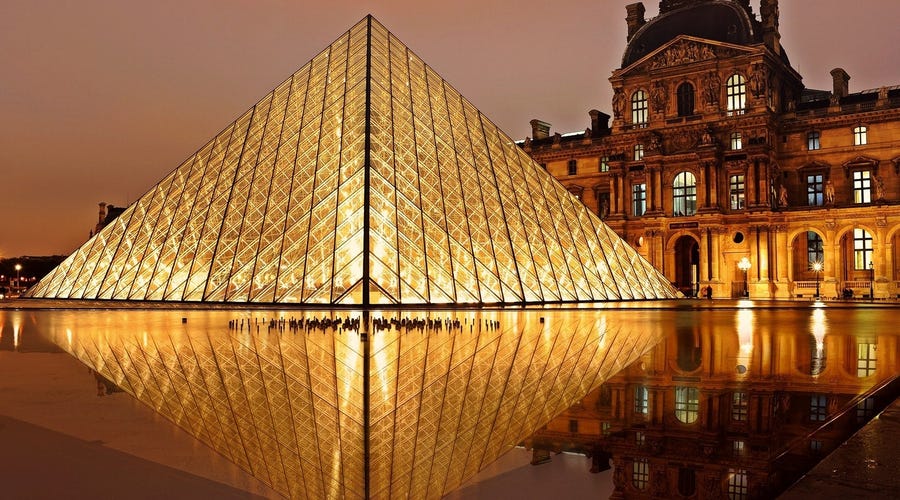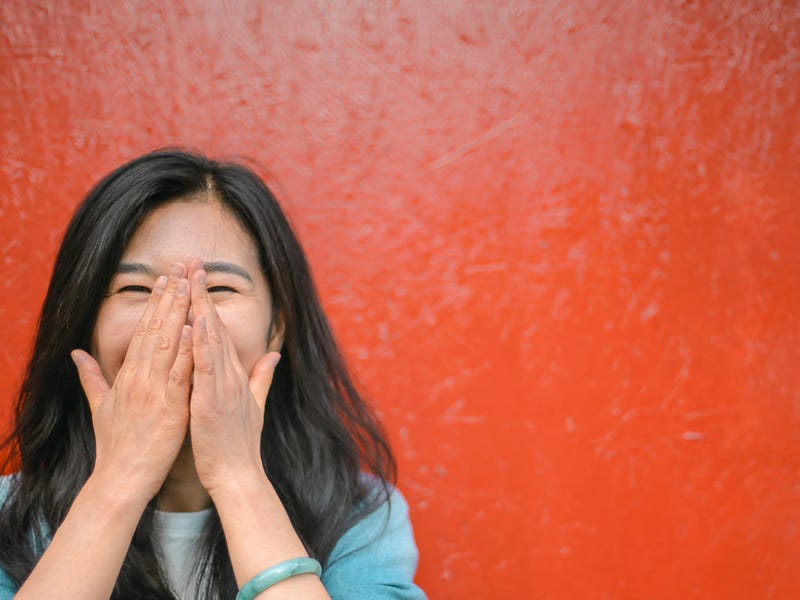
157 French adjectives to add a little color to words & life
Author: Elinor Zucchet
You’re in Montréal, strolling in Mont-Royal park. All of the sudden, you arrive at the Belvédère viewpoint over the skyline. “Oooooh, cette vue est….”. Well, you might literally be speechless, but if it’s a French vocabulary problem, we’re here to the rescue!
We have compiled more than 157 adjectives in French to help you find the right words in every situation, for example, when describing a landscape or person. You can also check our article on personality traits in French.
In this article, you’ll find:
- A list of the most common French adjectives, to cover the basics.
- A complete FAQ section, including masculine and feminine adjectives in French, placement of adjectives in French, and many more.
À vos cerveaux, prêts, partez !

What are adjectives?
As in English, adjectives are used to describe nouns. However, their similarities stop there. The characteristics of French adjectives are:
- They modify nouns.
- They must follow the “accord” with the noun in gender and number.
- They usually follow nouns.
- They can be modified by adverbs.
For example:
My dog is red.
Mon chien est rouge — What, you’ve never heard of Clifford?
My clothes are red.
Mes habits sont rouges.
French adjectives agreement
As mentioned above, French adjectives have an agreement with nouns. Yes, at some point in the history of the French language, they signed a contract!
Jokes aside, it only means that adjectives need to agree with the noun in number and gender. So, if the noun is plural, the adjective will be plural. If the noun is feminine, the adjective will be feminine. And it can be both, for example:

My girlfriend is beautiful.
Ma copine est belle.
My girlfriends are beautiful.
Mes copines sont belles — no judgement here.
This article on French pronouns might also be helpful.
Keep reading for a varied French adjectives list!
157 common adjectives in French for a colorful vocab boost
| English | French, Masculine | French, Feminine | Plural (masculine) | IPA pronunciation, Masculine |
| small | petit | petite | petits | pəti |
| big/tall | grand | grande | grands | gɾɑ̃ |
| giant/huge | gigantesque | gigantesque | gigantesques | ʒigɑ̃tɛskə |
| dangerous | dangereux | dangereuse | dangereux | dɑ̃ʒəɾø |
| funny | drôle | drôle | drôles | dɾolə |
| great | super | super | super | sype |
| nice | sympathique | sympathique | sympathiques | sɛ̃patikə |
| beautiful/handsome | beau | belle | beaux | bo |
| comfortable | comfortable | comfortable | comfortables | kõfɔɾtablə |
| difficult | difficile | difficile | difficiles | difisilə |
| quiet(calm) | calme | calme | calmes | kalmə |
| easy | facile | facile | faciles | fasilə |
| rich/wealthy | riche | riche | riches | ɾiʃə |
| poor | pauvre | pauvre | pauvres | povɾə |
| clean | propre | propre | propres | pɾɔpɾə |
| dirty | sale | sale | sales | salə |
| shy | timide | timide | timides | timidə |
| fast | rapide | rapide | rapides | ɾapidə |
| slow | lent | lente | lents | lə |
| good | bon | bonne | bons | bõ |
| cute | mignon | mignonne | mignons | miɲõ |
| bad | mauvais | mauvaise | mauvais | move |
| pretty | joli | jolie | jolis | ʒɔli |
| nice | gentil | gentille | gentils | ʒɑ̃til |
| strong | fort | forte | forts | fɔɾ |
| crazy | fou | folle | fous | fu |
| weird | bizarre | bizarre | bizarres | bizarə |
| scary | effrayant | effrayante | effrayants | ɛfɾɛjɑ̃ |
| angry | fâché | fâchée | fâchés | fɑʃe |
| expensive | cher | chère | chers | ʃεɾ |
| brave | courageux | courageuse | courageux | kuɾaʒø |
| disoriented | désorienté | désorientée | désorientés | dezɔɾjɑ̃te |
| difficult | difficile | difficile | difficiles | difisilə |
| ambitious | ambitieux | ambitieuse | ambitieux | ɑ̃bisjø |
| exhausted | épuisé | épuisée | épuisés | epɥize |
| tired | fatigué | fatiguée | fatigués | fatige |
| serious | grave | grave | graves | gɾavə |
| big/fat | gros | grosse | gros | gɾo |
| fair | juste | juste | justes | ʒystə |
| free | libre | libre | libres | libɾə |
| best | meilleur | meilleure | meilleurs | mɛjœɾ |
| new | nouveau | nouvelle | nouveaux | nuvo |
| light | léger | légère | légers | leʒe |
| ugly | moche | moche | moches | mɔʃə |
| sorry | navré | navrée | navrés | navɾe |
| same | pareil | pareille | pareils | paɾɛj |
| broke | ruiné | ruinée | ruinés | ɾɥine |
| in a hurry | pressé | pressée | pressés | pɾɛse |
| ready | prêt | prête | prêts | pɾe |
| delighted | ravi | ravie | ravis | ɾavi |
| relaxed | détendu | détendue | détendus | detɑ̃dy |
| quiet | tranquille | tranquille | tranquilles | tɾɑ̃kilə |
| hard-working | travailleur | travailleuse | travailleurs | tɾavajœɾ |
| sad | triste | triste | tristes | tɾistə |
| curious | curieux | curieuse | curieux | kyɾjø |
| old | vieux | vieille | vieux | vjø |
| naughty/mean | méchant | méchante | méchants | meʃɑ̃ |
| worried | inquiet | inquiète | inquiets | ɛ̃kje |
| high | haut | haute | hauts | o |
| low | bas | basse | bas | ba |
| breathtaking | époustouflant | époustouflante | époustouflants | epustuflɑ̃ |
| thin | mince | mince | minces | mɛ̃sə |
| soft | doux | douce | doux | duks |
| clear | clair | claire | clairs | klɛɾ |
| patient | patient | patiente | patients | patjə |
| last | dernier | dernière | derniers | dɛɾnje |
| poisonous | vénimeux | vénimeuse | vénimeux | venimø |
| alone | seul | seule | seuls | sœl |
| impatient | impatient | impatiente | impatients | ɛ̃patjə |
| serious | sérieux | sérieuse | sérieux | seɾjø |
| young | jeune | jeune | jeunes | ʒœnə |
| rustic | rustique | rustique | rustiques | ɾystikə |
| curly | bouclé | bouclée | bouclés | bukle |
| happy | heureux | heureuse | heureux | (ø)ɾø |
| leaning/tilted | penché | penchée | penchées | pɑ̃ʃe |
| stiff | raide | raide | raides | ɾɛdə |
| polite | poli | polie | polis | pɔli |
| rude | impoli | impolie | impolis | ɛ̃pɔli |
| weak | faible | faible | faibles | fɛblə |
| cheap | bon marché | bon marché | bon marché | bõ maɾʃe |
| big | volumineux | volumineuse | volumineux | vɔlyminø |
| horrible | horrible | horrible | horribles | ɔriblə |
| great | formidable | formidable | formidables | fɔɾmidablə |
| smart | intelligent | intelligente | intelligents | ɛ̃tɛliʒə |
| stupid | stupide | stupide | stupides | stypidə |
| interesting | intéressant | intéressante | intéressants | ɛ̃teɾɛsɑ̃ |
| boring | ennuyeux | ennuyeuse | ennuyeux | ɛnɥjø |
| trendy | branché | branchanée | branchés | bɾɑ̃ʃe |
| reasonable | raisonnable | raisonnable | raisonnables | ɾɛzɔnablə |
| strict | strict | stricte | stricts | stɾik |
| unhappy | malheureux | malheureuse | malheureux | mal(ø)ɾø |
| famous | célèbre | célèbre | célèbres | selɛbɾə |
| popular | populaire | populaire | populaires | pɔpylɛɾə |
| emotional | émotif | émotive | émotifs | emɔtif |
| useful | utile | utile | utiles | ytilə |
| hot | chaud | chaude | chauds | ʃo |
| whimsical | fantasque | fantasque | fantasques | fɑ̃taskə |
| pale | pâle | pâle | pâles | pɑlə |
| tanned | bronzé | bronzée | bronzés | bɾõze |
| foolish | idiot | idiote | idiots | idjo |
| happy | content | contente | contents | kõtə |
| laughing | rieur | rieuse | rieurs | ɾjœɾ |
| positive | positif | positive | positifs | pozitif |
| negative | négatif | négative | négatifs | negatif |
| greedy | gourmand | gourmande | gourmands | guɾmɑ̃ |
| first | premier | première | premiers | pɾəmje |
| last | dernier | dernière | derniers | dɛɾnje |
| previous | précédent | précédente | précédents | pɾesedə |
| next | suivant | suivante | suivants | sɥivɑ̃ |
| brilliant | brillant | brillante | brillants | bɾijɑ̃ |
| gifted | doué | douée | doués | dwe |
| talented | talentueux | talentueuse | talentueux | talɑ̃tœyks |
| reasonable | raisonnable | raisonnable | raisonnables | ɾɛzɔnablə |
| blasé | blasé | blasée | blasés | blaze |
| exciting | excitant | excitante | excitants | ɛkssitɑ̃ |
| thrilling | passionnant | passionnante | passionnants | pasjɔnɑ̃ |
| fascinating | fascinant | fascinante | fascinants | fassinɑ̃ |
| appetizing | appétissant | appétissante | appétissants | apetisɑ̃ |
| attractive | attrayant | attrayante | attrayants | atɾɛjɑ̃ |
| picturesque | pittoresque | pittoresque | pittoresques | pitɔɾɛskə |
| magnificent | magnifique | magnifique | magnifiques | maɲifikə |
| beautiful | superbe | superbe | superbes | sypɛɾbə |
| incredible | incroyable | incroyable | incroyables | ɛ̃kɾwajablə |
| awesome | génial | géniale | géniaux | ʒenjal |
| fantastic | fantastique | fantastique | fantastiques | fɑ̃tastikə |
| sunny | ensoleillé | ensoleillée | ensoleillés | ɑ̃sɔlɛje |
| rainy | pluvieux | pluvieuse | pluvieux | plyvjø |
| cloudy | nuageux | nuageuse | nuageux | nɥaʒø |
| white | blanc | blanche | blancs | blɑ̃k |
| black | noir | noire | noirs | nwaɾ |
| gray | gris | grise | gris | gɾi |
| yellow | jaune | jaune | jaunes | ʒonə |
| orange | orange | orange | orange | ɔɾɑ̃ʒə |
| red | rouge | rouge | rouges | ɾuʒə |
| pink | rose | rose | roses | ɾozə |
| purple | violet | violette | violets | vjɔle |
| green | vert | verte | verts | vɛɾ |
| blue | bleu | bleue | bleus | blø |
| fun | amusant | amusante | amusants | amyzɑ̃ |
| complicated | compliqué | compliquée | compliqués | kõplike |
| simple | simple | simple | simples | sɛ̃plə |
| hairy | poilu | poilue | poilus | pwaly |
| thick | épais | épaisse | épais | epe |
| thin | fin | fine | fins | fɛ̃ |
| close | proche | proche | proches | pɾɔʃə |
| far | loin | loin | loin | lwɛ̃ |
| long | long | longe | longs | lõ |
| short | court | courte | courts | kuɾ |
| narrow | étroit | étroite | étroits | etɾwa |
| wide | large | large | larges | laɾʒə |
| full | plein | pleine | pleins | plɛ̃ |
| empty | vide | vide | vides | vidə |
| light | léger | légere | légers | leʒe |
| heavy | lourd | lourde | lourds | luɾ |
| cold | froid | froide | froids | fɾwa |
| wet | humide | humide | humides | ymidə |
| dry | sec | sèche | secs | sɛk |
| fragile | fragile | fragile | fragiles | fɾaʒilə |
| robust | robuste | robuste | robustes | ɾɔbystə |
FAQ for adjectives in French
1. French feminine and masculine adjectives
Unfortunately, there is no one-size-fits-all rule for masculine and feminine in French. Sorry guys! This funny video will help you feel better!
LA Table 😂 French vs English - Loic Suberville
Over time, you’ll learn the gender of the most common words. In many instances, you can add an “e” at the end of the masculine adjective to get the feminine. If there’s already an “e”, usually the feminine will be the same as the masculine.
2. How to make French adjectives plural
As a general rule, add an “s” to the end of the masculine or feminine adjective to get the plural form. Adjectives ending with an “x” in their singular form stay the same in plural. Of course, it’s French, so you’ll find a few exceptions!
3. Placement of French adjectives
Adjectives in French usually follow nouns… but not always. Otherwise, it wouldn’t be French, right?
You can memorize the acronym BANGS for adjectives that usually go before the noun:
- B for Beauty: beau, joli, etc.
- A for Age: vieux, jeune, etc.
- N for Numbers in French
- G for Goodness: mauvais, bon, etc.
- S for Size: haut, gros, petit, etc.
4. How to add emphasis to French adjectives (i.e. very, really, truly).
French people are known for their moderate enthusiasm. More on this here.
However, there are words you can use to emphasize what you want to say. For example, a French person might say: “Ce paysage est superbe” (This landscape is wonderful). But if this is not enough for you — you’re American, I get it! — you can say “Ce paysage est vraiment superbe” or “Ce paysage est très beau” (This landscape is really wonderful or very beautiful).
If you really want to sound French though, try to use these emphasis words to complain: “Ce service est vraiment nul”, “Ce cours est très ennuyeux” (This service is really bad, This class is very boring).
Life without adjectives would be very dull, right?
Imagine not being able to describe anything. It would be just like the “like” button on social media before the arrival of “love”, “hahaha”, “sad”, “angry” and “wow” options!
So, reflect on this if you’re having trouble learning the order of adjectives in French or the feminine and masculine forms. And don’t worry, you’re not the only one.
Adjectives add color to our thoughts and emotions… and to our French vocab!


